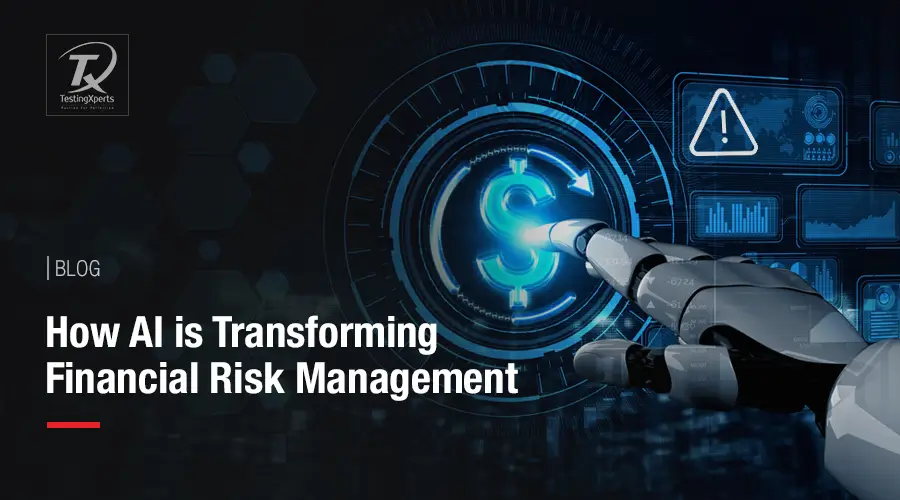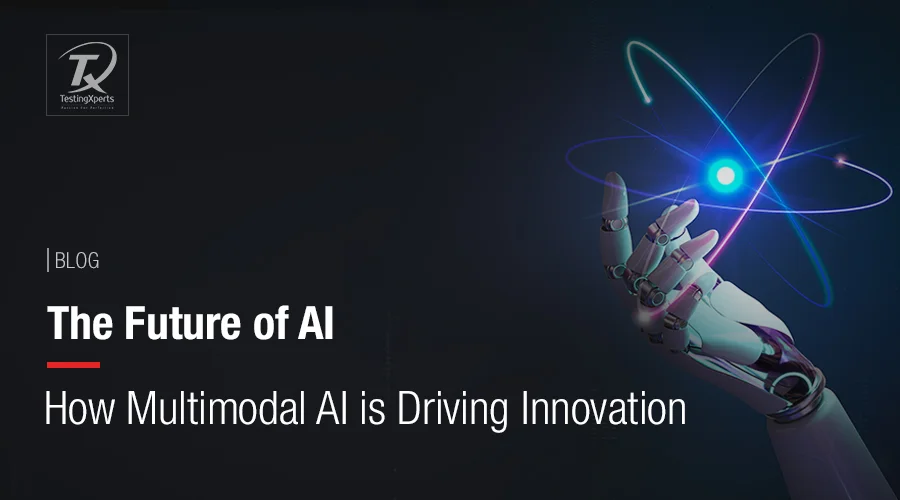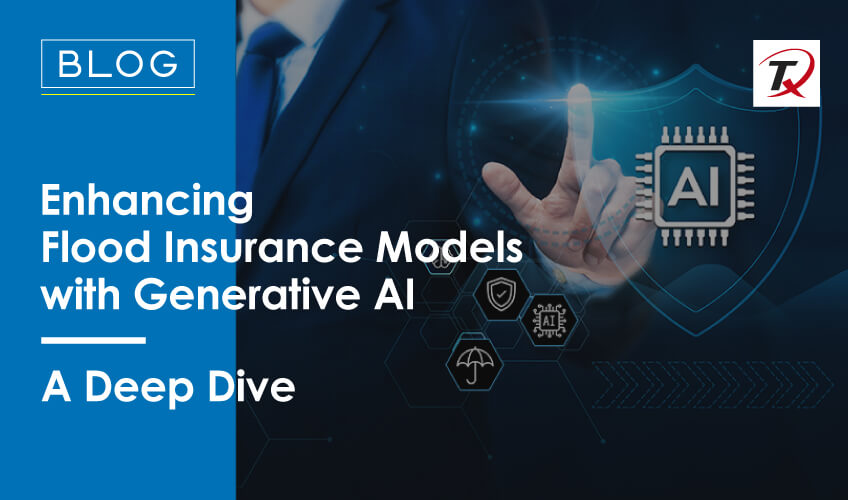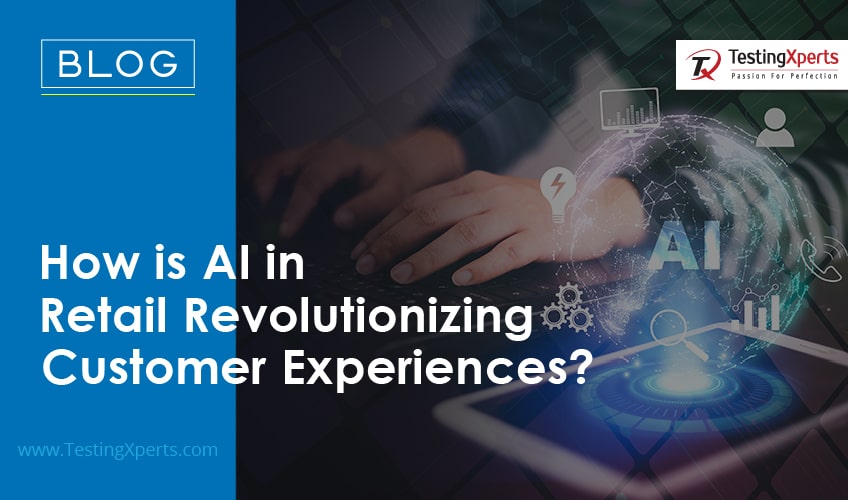
Table of Contents
- Why consider implementing AI in Retail?
- The Benefits of AI in Retail
- Leveraging AI in Retail for Test Case Generation
- Overcoming AI Implementation Challenges in Retail
- The Impact of AI in Retail Industry
- Overcoming AI Implementation Challenges in Retail
- Conclusion
- How Can TestingXperts help you with AI and ML Services in the Retail Industry?
The retail industry has seen a dramatic shift toward digital transformation in recent years. Businesses are relying more and more on technology to optimize their operations. Automated testing has become increasingly important in this changing environment for maintaining software quality and reducing costs associated with manual testing. Notably, the introduction of AI and ML has significantly changed automated testing, giving retailers the ability to quickly and accurately evaluate the performance of their software applications.
In this blog, we will delve into the role played by AI and ML in automated testing within the retail industry, highlighting their advantages, obstacles, and best practices for implementation.
Why consider implementing AI in Retail?
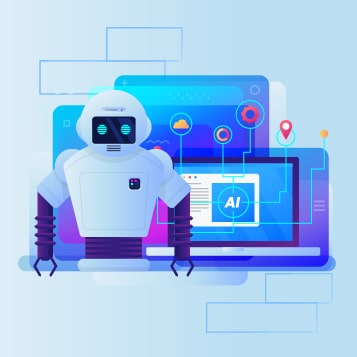
By 2025, the global AI in retail market is projected to reach approximately $15.3 billion.
Adopting Artificial Intelligence (AI) and Machine Learning (ML) is not only a choice in the highly competitive retail industry; it is the only way to achieve unmatched success. Use AI to increase your profitability by up to 25% using dynamic pricing techniques. It’s critical to say goodbye to inventory problems because AI-enabled demand forecasting reduces holding costs by 30% while boosting sales by a stunning 10%. These figures emphasize the significance of deepening consumer insights, enhancing security with AI-driven fraud detection, and being proactive in adapting to market developments.
The Benefits of AI in Retail

AI and ML both offer a plethora of advantages for retailers looking to stay competitive and meet evolving customer demands. Here are some key benefits:
Improved Inventory Management:
AI and ML enable accurate demand forecasting by considering historical sales data, seasonal trends, economic factors, and even external events (e.g., holidays, promotions).
Retailers can optimize inventory levels, reducing carrying costs while ensuring products are available when and where customers need them.
Inventory accuracy helps prevent costly overstocking and stockouts, improving overall supply chain efficiency.
Personalized Customer Experiences:
AI and ML algorithms analyze vast amounts of customer data, including purchase history, browsing behavior, and preferences.
Retailers can use this data to provide personalized product recommendations and content, leading to higher conversion rates and customer satisfaction.
Personalization fosters a stronger emotional connection between the customer and the brand, encouraging repeat purchases and brand loyalty.
Dynamic Pricing Strategies
AI-powered dynamic pricing algorithms continuously analyze market conditions, competitor pricing, and customer behavior.
Retailers can adjust prices in real-time to maximize profitability. For example, prices can be lowered to boost sales during slow periods or increased when demand is high.
This pricing flexibility helps retailers stay competitive, capture more revenue, and respond quickly to market changes.
Enhanced Operational Efficiency:
AI and ML automation streamline various retail operations, reducing the need for manual intervention.
Chatbots and virtual assistants powered by AI handle routine customer inquiries, freeing up human staff to focus on more complex tasks.
In supply chain management, AI-driven predictive analytics can optimize routes, reduce transportation costs, and minimize delays.
Automation also extends to fraud detection, where AI algorithms identify suspicious activities faster and with greater accuracy than manual methods.
Overall, improved operational efficiency leads to cost savings and a better allocation of resources.
Data-Driven Decision Making:
AI and ML provide valuable insights from vast datasets that would be impossible to analyze manually.
Retailers can make data-driven decisions related to pricing, inventory management, marketing strategies, and even store layout optimization.
Predictive analytics help retailers anticipate trends and respond proactively, ensuring they remain competitive and relevant in a rapidly changing market.
Businesses can create more individualized and effective consumer experiences, optimize their supply chains, increase profitability, and make wise decisions based on real-time data by integrating AI in retail operations. These technologies have developed into crucial resources for surviving and thriving in the contemporary retail environment.
A digital revolution is currently sweeping the retail sector, and technology is completely changing how customers shop. Assuring the quality and dependability of software programs is crucial in this fast-paced environment. Enter AI-Powered Test Automation, a revolutionary strategy that promises not only testing efficiency but also a completely new degree of accuracy.
Leveraging AI in Retail for Test Case Generation
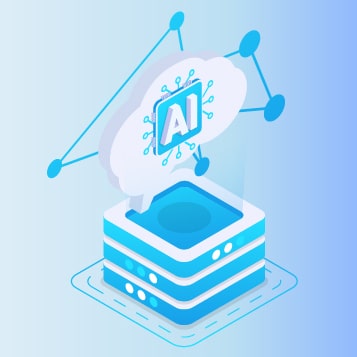
Consider a scenario in which test cases are intelligently created and adjusted to changes in your application. That is precisely what AI contributes. The capacity of AI to construct test cases dynamically is a game-changer in the retail sector, where e-commerce platforms, mobile apps, and in-store experiences must coexist in an unbroken manner.
With the use of AI in retail, test scenarios specific to important user journeys are generated after analysis of your application. Your tests will continue to be effective and relevant as a result of its ability to adapt to UI changes, new product additions, and other changes.
AI-Driven Test Execution and Result Analysis for the Retail Industry
The showstopper in AI-Powered Test Automation is the execution phase. Traditional automation tools follow predefined scripts, often missing subtle issues that can slip through the cracks. But, AI takes a different approach.
AI doesn’t just follow instructions blindly in retail, where the user experience is essential; instead, it investigates your application like an inquisitive shopper. It picks up on the intended behavior, spotting variations that a human tester could miss. The accuracy of AI is unrivaled, whether it’s monitoring payment gateways, inventory updates, or responsive design across devices.
But AI doesn’t stop at execution. It’s the mastermind behind result analysis too. It not only reports defects but also provides insights into why they occurred. This means faster resolution and continuous improvement.
The Impact of AI in Retail Industry
The retail industry, with its ever-evolving landscape and fiercely competitive market, has witnessed a profound transformation in recent years thanks to Artificial Intelligence (AI) and Machine Learning (ML). These cutting-edge technologies are not just buzzwords but catalysts for revolutionizing every facet of the retail experience.
With its constantly changing environment and extremely competitive market, the retail sector has undergone a significant transition recently thanks to artificial intelligence (AI) and machine learning (ML). These innovative technologies are more than simply trendy terms; they represent the driving force behind the retail industry’s complete metamorphosis.
Overcoming AI Implementation Challenges in Retail
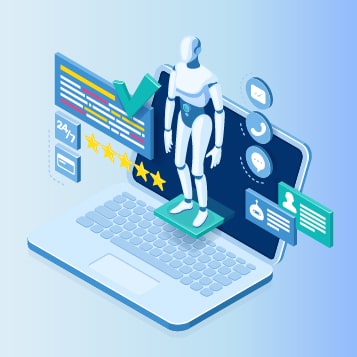
Picture it as a thrilling adventure, where hurdles such as data quality, scalability, and talent shortages transform into opportunities for growth. Each challenge conquered is a milestone on the path to unlocking the immense potential of AI and ML, making the journey all the more exhilarating.
Yet, as we ascend this technological peak, we must also heed the call of a quieter, yet equally significant realm – the Ethical and Regulatory Concerns in Retail Testing. Here, in the heart of AI’s transformative power, ethical considerations become our guiding stars.
Fairness, transparency, and data privacy are the keepers of trust in the dynamic world of retail testing, where AI and ML alter customer experiences. It takes skill to strike the correct balance between maximizing AI and ML’s capabilities and making sure they follow moral guidelines and legal requirements.
What AI and ML should achieve is more important than merely what they are capable of. We must be cautious when we enter this realm and ensure that each invention is consistent with the moral principles that guide our society. Despite the complexity of this journey, it holds out hope for a time when AI and ML will improve our quality of life while upholding our morals and convictions.
Conclusion
AI and ML enable retailers to predict customer demands with unprecedented precision, optimize inventory management, and personalize shopping experiences. They streamline testing procedures, automate repetitive tasks, and ensure the seamless operation of retail applications, both online and in-store.
But even as we celebrate the seemingly limitless promise of AI and ML, it’s important to recognize the difficulties they pose, from concerns about data quality to moral and legal dilemmas. A top priority is finding the correct balance between utilizing these technologies for expansion and assuring their ethical and responsible use.
How Can TestingXperts help you with AI and ML Services in the Retail Industry?

Retail-Centric Expertise: TestingXperts possesses in-depth domain knowledge and experience specific to the retail industry. We understand the nuances of retail operations, customer expectations, and market trends, allowing us to provide tailored AI and ML solutions that address retail-specific challenges effectively.
End-to-End Testing Services: TestingXperts provides comprehensive end-to-end testing services for AI and ML implementations in retail. From test strategy and planning to test execution and reporting, we cover the entire testing lifecycle. Our approach ensures the reliability, scalability, and performance of AI-powered retail applications.
Customized AI and ML Models: We don’t offer generic AI and ML solutions. TestingXperts collaborates closely with retail clients to develop customized AI and ML models that align with their unique business objectives. Whether it’s demand forecasting, personalized recommendations, or inventory optimization, our solutions are designed to meet your precise needs.
Ethical AI Testing: Ethical considerations are crucial in AI and ML deployments. TestingXperts employs ethical AI testing practices to detect and mitigate bias, fairness issues, and transparency concerns in retail AI models. We ensure that your AI solutions align with ethical guidelines and industry best practices.
Data Privacy and Security: Retail businesses handle sensitive customer and business data. TestingXperts prioritizes data privacy and security by adhering to stringent data protection measures and compliance with relevant regulatory standards. Our AI and ML solutions are designed to safeguard your data and maintain the trust of your customers.
These exclusive differentiators set TestingXperts apart as a trusted partner for AI and ML services in the retail industry, ensuring that our solutions are not only technologically advanced but also highly relevant and tailored to the unique demands of the retail sector. Get in touch with our experts to know more about how we can help you advance and sustain in the retail industry.
Discover more
Get in Touch
Stay Updated
Subscribe for more info


